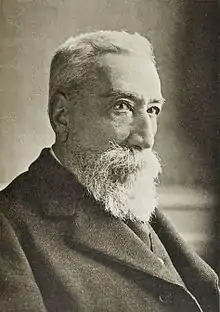| Anatole France | |
 "in recognition of his brilliant literary achievements, characterized as they are by a nobility of style, a profound human sympathy, grace, and a true Gallic temperament" | |
| Date |
|
| Location | Stockholm, Sweden |
| Presented by | Swedish Academy |
| First awarded | 1901 |
| Website | Official website |
The 1921 Nobel Prize in Literature was awarded to the French author Anatole France "in recognition of his brilliant literary achievements, characterized as they are by a nobility of style, a profound human sympathy, grace, and a true Gallic temperament".[1]
Laureate
Anatole France (pseudonym for Jacques-Anatole-François Thibault, 1844-1924) started writing poems in the classical tradition, but became known for his prose works. His stories and novels are noted for wit and irony, scepticism, social preoccupations and clarity in the classical tradition. Notable works include the four volume novel sequence collected under the title L’Histoire contemporaine (1897–1901).[2]
Nominations
Anatole France was nominatad 13 times since 1904 before he was awarded. In 1921 three nominations for him was submitted to the Nobel committee.[3] Other nominated authors in 1921 included Arno Holz, Arne Garborg, Stefan Zeromski, Émile Boutroux, Gunnar Gunnarsson, H. G. Wells, Jacinto Benavente (awarded in 1922), W. B. Yeats (awarded in 1923), George Bernard Shaw (awarded in 1925), Grazia Deledda (awarded in 1926), Henri Bergson (awarded in 1927) and John Galsworthy (awarded in 1932).[4]
Prize decision
Anatole France hade for long been mentioned in the press as a popular choice for the Nobel prize. He hade been discussed by the Nobel committee for the 1904 prize, but his candidacy was then dismissed by the committee, partly because of the "offensive eroticism" in his novels which according to committee member Carl David af Wirsén was not in line with Alfred Nobels guideline of an "ideal direction". Later Anatole France's left wing political views was also held against him by Wirsén. The Nobel committee recommended that the 1921 prize should be awarded to John Galsworthy, but committee member Henrik Schück successfully argued for a prize to France, who subsequently was awarded the 1921 Nobel Prize in literature.[5]
References
- ↑ The Nobel Prize in Literature 1921 nobelprize.org
- ↑ "Anatole France". britannica.com.
- ↑ "Nomination archive Anatole France". nobelprize.org.
- ↑ "Nomination archive Literature 1921". nobelprize.org.
- ↑ Gustav Källstrand Andens Olympiska Spel. Nobelprisets historia Fri Tanke 2021, p. 436